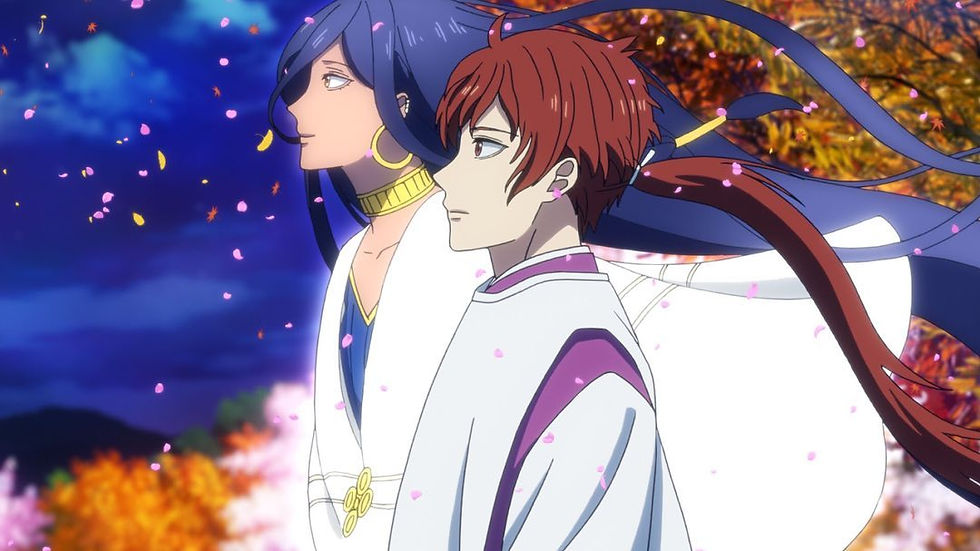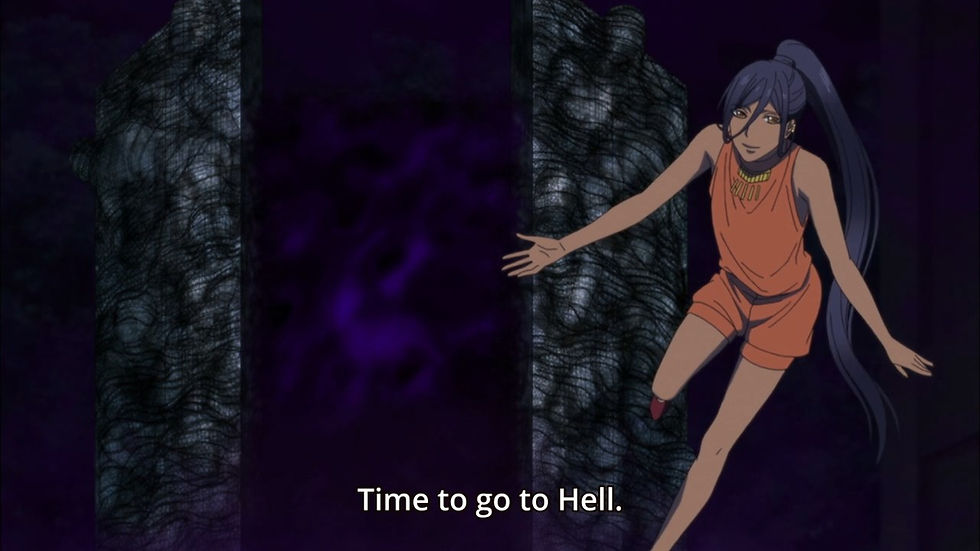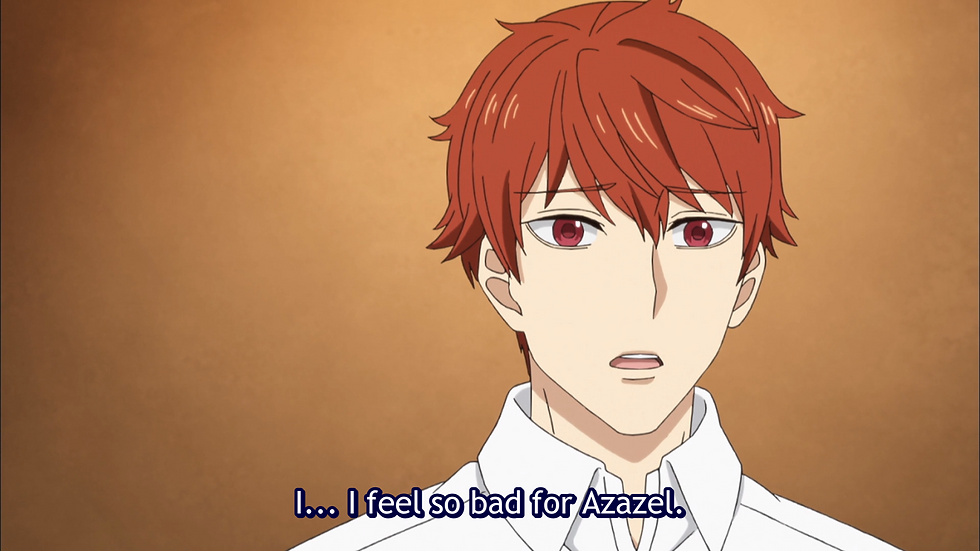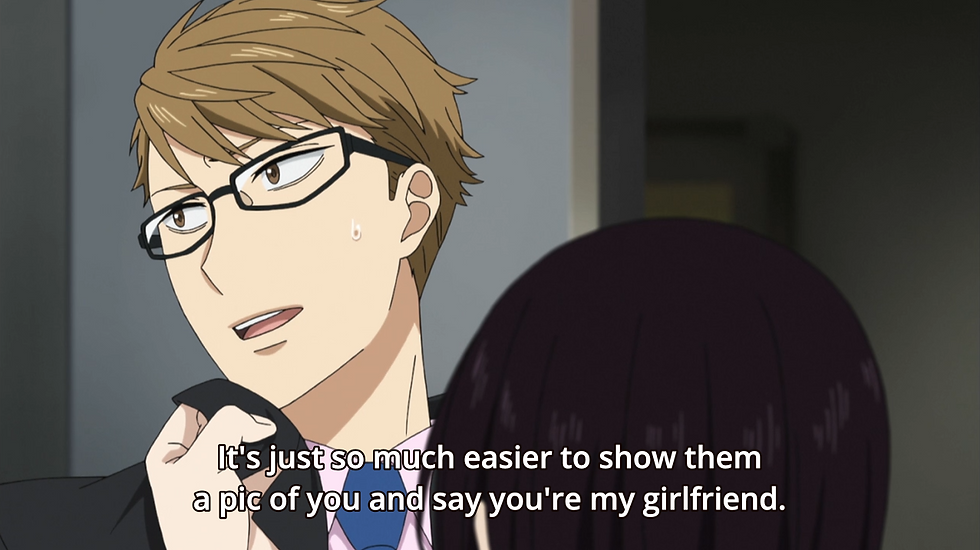Anime Review: Mayonaka no Occult Koumuin
- Joseph Lutholtz
- Jul 24, 2019
- 8 min read

Alternative Name: Midnight Occult Civil Servants
Score: 5/10, 4/5
Length: 12 Episodes
Genre: Mystery, Drama, Political, Supernatural, Slice of Life, Yaoi
Summary: Throughout history, mankind has needed intermediaries to maintain the balance between the world of men and the supernatural. Whether they be gods, demons, or simple spirits, it has been the duty of spiritualists and mediums to keep the peace. A lot has changed since the age of the onmyoji, though. In today's society, very few can see, let alone speak to the supernatural elements that have, like us, adapted to modern living. Rather than relying on potentially fraudulent psychics and mediums, the government has turned to tackling all supernatural problems with science, logic, and order. Now, it is the job of specially trained civil servants to find a way to either coexist with the gods that live among them or eliminate these relics of the past for the sake of humanity's future. That does not necessarily mean, however, that the need for true spiritualists has changed.
Review: Negative as the phrase might sound, "aggressively mediocre" is the most concise, fair, and accurate description of Midnight Occult Civil Servants I can offer. Though this series does offer a fairly new and interesting approach to the old, tired concept of the supernatural interacting with the mundane world, it fails to do anything with that novelty. Specifically, the series offers a layer of intrigue and discussion to the standard supernatural drama by using its supernatural elements to discuss how globalization has influenced Japanese society and media. Put more simply, it shows how Japan's mythology has started to fade into obscurity as knowledge of the religious traditions and histories of the rest of the world has become more easily accessible. From the angels of the Judeo-Christian faith living in the Imperial Palace Gardens to the deities of the Greek, Aztec, and even Ukrainian pantheons that come and go as they please, we see how a veritable invasion of non-traditional beliefs taken root in Japanese society. As interesting and nuanced as that line of thought might be, though, the series doesn't ever really address the topic in of itself. It's a narrative throughline that is ever-present in the series yet it ultimately ends up being little more than an afterthought when all is said and done. So, rather than addressing this topic, the show spends its time following the incredibly basic and often dull lives of its human cast.

A statement of that magnitude should be engaging and exciting, not the preamble
to five straight minutes of doing paperwork and map triangulation.
This rift between what could be done and what is actually done is what I mean when I say that the show is "aggressively mediocre." While there are a lot of interesting characters, concepts, and implications to consider with this show's world of globalized mythology, the series opts, instead, to be little more than a watered-down clone of The X-Files without any of the supernatural intrigue. Everything that might have been legitimately fun or suspenseful is either glossed over to the point of being irrelevant or stated so plainly that the supernatural feels so mundane that the supernatural ends up becoming superficial. For example, one of the show's initial points of engagement is the identity and historical importance of the show's main perspective character, Miyako Arata. At the show's start, it is generally assumed that Arata is meant to serve as the audience's sock puppet. He has no real personality to speak of beyond being an amicable pushover. He has no experience with the supernatural Anothers or knowledge that they even exist. So, through him, we are introduced to this world in which spirits, gods, and demons live alongside humans without ever being seen by them. As the new recruit for the "Nocturnal Community Relations Division," he is introduced to both the existence of the Anothers and humanity's desensitized, matter-of-fact manner of dealing with them. With this discovery, though, Arata learns that he is uniquely qualified to handle the supernatural specifically because, unlike anyone else in this field, he can actually communicate with these beings. As if that wasn't enough for Arata to take in in one day, it is also revealed that he might possess the mythical "ears of sand" ability because he's the reincarnation of Abe no Seimei.

Can you see the similarities? One's a social worker. The other is a spiritualist integral to Japanese folklore.

As I've said already, though, the show doesn't actually do anything with this revelation. While a statement of that magnitude would normally make someone question their identity or ponder how his joining the supernatural police was fated, all Arata does is shrug it off and continue to claim that he is himself. Worse than that, the series doesn't even use the word "reincarnation" to describe Arata's situation. Rather, the show simply states that Arata is a distant relative of the onmyoji. Even though he looks just like Seimei and that every Another refers to him as Seimei, the show tries to sidesteps the implications of reincarnation while also using it as an easy excuse for Arata to talk his way out of any problem. The contradictory nature of Arata's origin only becomes a larger issue, though, as we are introduced to the Aztec god Huehuecoyotl (aka Kohaku) who, according to this series, was a lifelong companion of Seimei. Upon meeting Arata, Kohaku immediately recognizes Arata as Seimei's reincarnation and treats him with the same kind of chaotic puckishness. During the entirety of this exchange, Arata flip-flops back and forth between only being himself or being Seimei to suit his problem and that's more or less the problem here. From the start, Arata doesn't really have a character to speak of beyond being a "good guy" sock puppet protagonist. So, having the show only give vague affirmations on who or what he is doesn't do his role to the series any favors. It just makes it that much harder to care about him or all the trouble he finds himself in because he simultaneously is and isn't Japan's renowned spiritualist.

And that doesn't even factor what a problem Kohaku is, in general.
Sad as I am to say it, that kind of thoughtless drama is pretty much this show's bread and butter. Even though there are some moments in the series that can be genuinely unnerving or tense, all that emotional cache evaporates as the action is supposed to pick up. For example, one of the show's long-running dramatic arcs involved the history of Arata's coworker, Sakaki Kyouichi. Over the course of the series, it is repeated time and again that Kyouichi is specifically invested tracking down the Another responsible for kidnapping his sister and countless other girls. During the first few arcs, he steadily comes closer and closer to the truth as the team runs into and deals with cases that are tangentially connected to that very case. Yet, rather than giving Kyouichi his moment in the sun, the series effectively solves this grand conspiracy the minute Arata becomes personally involved. In a beautiful moment of contrived coincidence, Arata's childhood friend becomes the target of the demon Azazel and is kidnapped just like Kyouichi's sister. So, now that Arata's gotten involved, the plot immediately starts moving forward in leaps and bounds. Where it took Kyouichi years to make any headway in his sister's kidnapping, Arata is handed the culprit on a golden platter since all he needs to do is ask Kohaku to lead the team to Azazel's hideout. In doing this, he also ensures that nothing will happen to them on their way through Hell since Kohaku obviously won't let anything bad happen to his beloved Seimei. Instantly, all the intrigue, tension, and presumed threat are thrown out the window. Yet the thing that puts the nail in this arc's coffin, though, is the revelation that things would have sorted themselves out regardless of whether or not Arata got involved. In a cruel twist of fate, all the harm Azazel did is instantly undone as his plan just naturally falls apart and the girls are returned the same way they were found. The only real downside is trauma the girls and their families have to endure since none of them aged while they were kidnapped, making them decades younger than they should be.

Of course, being the goody two shoes he is, Arata feels sympathetic for the literal devil. The real mystery of this series is why Kyouichi didn't deck him for that comment.
On and on this half-assed dance goes until, eventually, the timer runs out and the series ends leaving me feeling bored and disappointed. While I can say that I ultimately didn't dislike it, it definitely didn't ever inspire me to care. Perhaps it was simply because it simply didn't live up to the potential I saw in it or maybe it was just doomed to be mediocre from the very beginning. Either way, the overall way the show was handled did it no favors. As I've said already, pretty much everything this show ever sets up just falls apart. From the nature of Arata's supernatural abilities to the flow of pretty much every arc, any hint of promise gets swept away in the sheer mediocrity of it all. Not once are we given a moment to really flesh out these characters. Rather than acting like people, they all end up being little more than cardboard cutouts that come and go whenever it suits the plot. Think to hard and millions of plot holes start to come up that sap any and all intrigue from the series. Most notably, the literal deus ex machina that is Huehuecoyotl might as well not exist at all for what little he offers the series. Despite being both the show's poster boy and a literal god of chaos, he rarely shows up for more than a few seconds each episode. Even then, all he ever does when he bothers to show up is act like a spoiled child or coyly fuel for the homosexual undertones that run throughout the series. What's worse, though, is that Huehuecoyotl isn't the only character to fill in that role. Whenever the god isn't available, the series simply passes that buck off to the other member of the supernatural police, Himezuka Seo. As the team's effeminate practitioner of witchcraft, Seo is pretty much equipped to be the solution to most any mystery thanks to some conveniently effective concoction or his incredible reference skills. But, of course, since he's often paired with Kyouichi, his effeminate looks get to play overtime for those who want to interpret their little spats as something more.

Granted, it's not like the show even tries to argue that there isn't something there.
It's obviously a bit of a disappointment whenever a show fails to meet your expectations but part of me wants to think it's worse when you can physically see the potential that the story simply refuses to tap into. Had in even remotely dug into the intrigue of how or why supernatural beings from across the globe have been taking up residence in Japan, I think I would have able to at least call it good. Since it refuses to even touch that subject or make use of the characters and ideas it set up, though, it ultimately ended up becoming something I can simply refer to as stubbornly or even aggressively mediocre. So, with that said, I obviously can't say I'm in a position to recommend it. It might not be so terrible that it deserves to be ignored outright but there are dozens of other series that actually do what Midnight Occult Civil Servants set up and they do it well. For example, if you haven't seen it already, I'd wholly recommend giving Noragami or even Fukigen no Mononokean a shot.


Comments